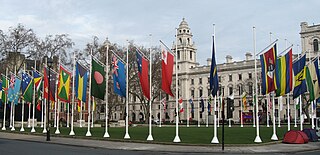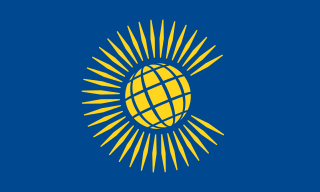The Commonwealth Heads of Government Meeting is a biennial summit meeting of the governmental leaders from all Commonwealth nations. Despite the name, the head of state may be present in the meeting instead of the head of government, especially among semi-presidential states. Every two years the meeting is held in a different member state and is chaired by that nation's respective prime minister or president, who becomes the Commonwealth Chair-in-Office until the next meeting. Queen Elizabeth II, who was the Head of the Commonwealth, attended every CHOGM beginning with Ottawa in 1973 until Perth in 2011, although her formal participation only began in 1997. She was represented by the Prince of Wales at the 2013 meeting as the 87-year-old monarch was curtailing long-distance travel. The Queen attended the 2015 summit in Malta and the 2018 summit in London, but was represented again by the Prince of Wales at the 2022 meeting in Rwanda.
The Commonwealth Secretariat is the main intergovernmental agency and central institution of the Commonwealth of Nations. It is responsible for facilitating co-operation between members; organising meetings, including the Commonwealth Heads of Government Meetings (CHOGM); assisting and advising on policy development; and providing assistance to countries in implementing the decisions and policies of the Commonwealth.

Commonwealth Day is the annual celebration of the Commonwealth of Nations, held on the second Monday in March. While the date holds some official status in select member states of the Commonwealth, observances of the date are not uniform across the Commonwealth, and the date is not celebrated as a public holiday in most Commonwealth countries.

The Head of the Commonwealth is the ceremonial leader who symbolises "the free association of independent member nations" of the Commonwealth of Nations, an intergovernmental organisation that currently comprises 56 sovereign states. There is no set term of office or term limit and the role itself has no constitutional relevance to any of the member states within the Commonwealth. The position is currently held by King Charles III.
The Harare Commonwealth Declaration was a declaration of the Commonwealth of Nations, setting out the Commonwealth's core principles and values, detailing the Commonwealth's membership criteria, and redefining and reinforcing its purpose. The Declaration was issued in Harare, Zimbabwe, on 20 October 1991, during the twelfth Commonwealth Heads of Government Meeting. It reaffirmed the political principles laid out in the Singapore Declaration of twenty years before, and is considered one of the two most important documents to the Commonwealth's uncodified constitution, until the adoption of the Charter of the Commonwealth in 2012.

The criteria for membership in the Commonwealth of Nations, which apply to current and prospective member states, have been altered by a series of documents issued over the past eighty-two years.
The Commonwealth Foundation (CF) is an intergovernmental organisation that was established by the Commonwealth Heads of Government in 1966, a year after its sister organisation, the Commonwealth Secretariat. The Foundation is located at Marlborough House in London, a former royal palace which was assigned for the use of these Commonwealth institutions by Her Majesty Queen Elizabeth II, the former Head of the Commonwealth. As the Commonwealth agency for civil society, the Foundation is funded by 49 member states to support participatory governance through its programmes. The Foundation provides resources, grants and access to platforms to encourage better engagement between civil society and institutions of governance. Membership of the Commonwealth Foundation is voluntary and is separate from membership of the Commonwealth of Nations.
The Edinburgh Declaration was a declaration by the heads of government of the Commonwealth of Nations concerning the organisation's membership criteria. Part of the final communiqué issued at the end of the fifteenth Commonwealth Heads of Government Meeting (CHOGM), the Declaration was an endorsement of the report of the Inter-Governmental Group on Criteria for Commonwealth Membership (IGCCM). It was issued on 27 October 1997, in Edinburgh, the United Kingdom.
The Commonwealth Youth Programme, also known as CYP, is an international development agency working with young people between the ages of 15 and 29. Part of the Commonwealth Secretariat, CYP is active in the Commonwealth's 54 member countries. CYP has a head office in London with four centres in Africa, Asia, Caribbean and Pacific. Currently there are Four Regional Directors and 16 programme officers plus support staff are working there.
The 1979 Commonwealth Heads of Government Meeting was the fifth Meeting of the Heads of Government of the Commonwealth of Nations. 39 countries attended the meeting. It was held in Lusaka, Zambia, between 1 August 1979 and 7 August 1979, and was hosted by that country's President, Kenneth Kaunda.

The Commonwealth of Nations is a voluntary association of 56 sovereign states. Most of them were British colonies or dependencies of those colonies.
The 2003 Commonwealth Heads of Government Meeting was the 18th Meeting of the Heads of Government of the Commonwealth of Nations. It was held in Abuja, Nigeria, between 5 December and 8 December 2003, and hosted by President Olusegun Obasanjo.

Zimbabwe and the Commonwealth of Nations have had a controversial and stormy diplomatic relationship. Zimbabwe is a former member of the Commonwealth, having withdrawn in 2003, and the issue of Zimbabwe has repeatedly taken centre stage in the Commonwealth, both since Zimbabwe's independence and as part of the British Empire.

The Commonwealth of Nations, often simply referred to as the Commonwealth, is an international association of 56 member states, the vast majority of which are former territories of the British Empire from which it developed. The chief institutions of the organisation are the Commonwealth Secretariat, which focuses on intergovernmental aspects, and the Commonwealth Foundation, which focuses on non-governmental relations among member states. Numerous organisations are associated with and operate within the Commonwealth.

The 1973 Commonwealth Heads of Government Meeting, officially known as the II Commonwealth Heads Meeting, and commonly known as Ottawa 1973, was the second Meeting of the Heads of Government of the Commonwealth of Nations. It was held from 2 to 10 August 1973 in Ottawa, hosted by Prime Minister Pierre Trudeau. It was the first CHOGM to be attended by the Head of the Commonwealth, Elizabeth II.

The 1946 Commonwealth Prime Ministers' Conference was the second Meeting of the Heads of Government of the British Commonwealth. It was held in the United Kingdom in from April to May 1946, and was hosted by that country's Prime Minister, Clement Attlee.
The 1953 Commonwealth Prime Ministers' Conference was the sixth Meeting of the Heads of Government of the Commonwealth of Nations. It was held in the United Kingdom in June 1953 on the occasion of the coronation of Queen Elizabeth II, and was hosted by that country's Prime Minister, Sir Winston Churchill.

The 1960 Commonwealth Prime Ministers' Conference was the tenth Meeting of the Heads of Government of the Commonwealth of Nations. It was held in the United Kingdom in May 1960, and was hosted by that country's Prime Minister, Harold Macmillan.
The 1965 Commonwealth Prime Ministers' Conference was the 14th Meeting of the Heads of Government of the Commonwealth of Nations. It was held in the United Kingdom in June 1965, and was hosted by that country's Prime Minister, Harold Wilson.
Patsy Blair Robertson was a Jamaican journalist and diplomat, who was Director of Information at the Commonwealth Secretariat and the Official Spokesperson for The Commonwealth from 1983 to 1994. She played a significant role in conjunction with Sir Shridath "Sonny" Ramphal, the Commonwealth's second Secretary-General, in that organisation's long battle against apartheid in South Africa. She later served with UNICEF, the UN, and as founding Chair of the Ramphal Institute, a London-based not-for-profit organization with a mission to advance knowledge and research in such areas of policy as development, education and environmental issues.








